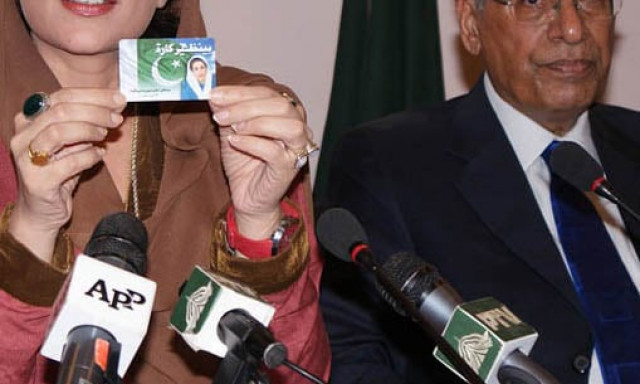BISP: Disbursements fall 13.5% short of target in 1st half
Govt doles out Rs42b against target of Rs48.6b in July-December.

The government has missed the Benazir Income Support Programme’s (BISP) cash transfer target, agreed with the International Monetary Fund (IMF), as disbursements stand 13.5% lower in the first half, depriving about 366,000 families of social security coverage.
Against the target of distributing Rs48.6 billion among over five million families, the government could dole out Rs42 billion among 4.7 million families from July to December of the current fiscal year, according to data compiled by the BISP Secretariat.
For the entire fiscal year 2014-15, Rs97.2 billion has been allocated for the BISP to be disbursed among 5.3 million families by June next year.
The IMF has set quarterly indicative ceilings for BISP disbursements aimed at ensuring that the government releases what it promises. However, it fell short of the target for the second quarter in a row in the current fiscal year.
The failure to reach the goal would not have any adverse implications for the upcoming release of an IMF loan tranche of $1.1 billion that the lender’s executive board is set to approve on Wednesday.

The ceilings are not part of the performance criteria or prior actions needed before the release of a loan installment. However, persistent failure to meet the target may prompt the IMF to make it a binding condition, according to experts.
Administrative reasons are blamed for the less-than-targeted disbursements as the government struggles to improve the BISP structure. It has recently appointed Shabbir Ahmed as secretary of the programme. Earlier, no secretary was willing to work with former BISP chairman Enver Beg.
Beg was accused of interfering in operational matters while his job was restricted to policy issues only in his capacity as chairman of the BISP board. Beg recently quit the post.
“The government is committed to extending cash disbursements to the poorest of the poor and bringing more beneficiaries into the system, but it is not an easy task,” said Shabbir Ahmed.
Transparency and efficiency would be given highest priority with a smooth delivery of services to the poor, he said.
Ahmed stressed that BISP activities had picked up pace recently as over 70,000 beneficiaries were provided fresh Benazir Debit Cards for receiving quarterly cash benefits.
The BISP is also trying to settle issues with commercial banks. One of the banks is accused of delaying the release of disbursements and using deposits of the beneficiaries.
Besides increasing cash transfers, Ahmed said, the BISP made payments to over 22,000 children at Rs200 per month under the Waseela-e-Taleem initiative. Under the programme, Rs200 per month per child is paid to those parents who send their children to schools.
The government will next month extend Waseela-e-Taleem to 32 districts around the country. In these districts, 3.5 million children are estimated to be out of schools and there are plans to get at least 1.5 million of them enrolled in the next two years.
According to the secretary, the BISP mechanism aimed at ensuring transparency and efficiency will be improved further and there is a need for restructuring of the staff.
The staff was responsible for late registration of BISP beneficiaries, he said and vowed to bring down the cost of administration and bank services fee in order to better utilise taxpayer funds.
Published in The Express Tribune, December 16th, 2014.
Like Business on Facebook, follow @TribuneBiz on Twitter to stay informed and join in the conversation.





1733130350-0/Untitled-design-(76)1733130350-0-208x130.webp)












COMMENTS
Comments are moderated and generally will be posted if they are on-topic and not abusive.
For more information, please see our Comments FAQ